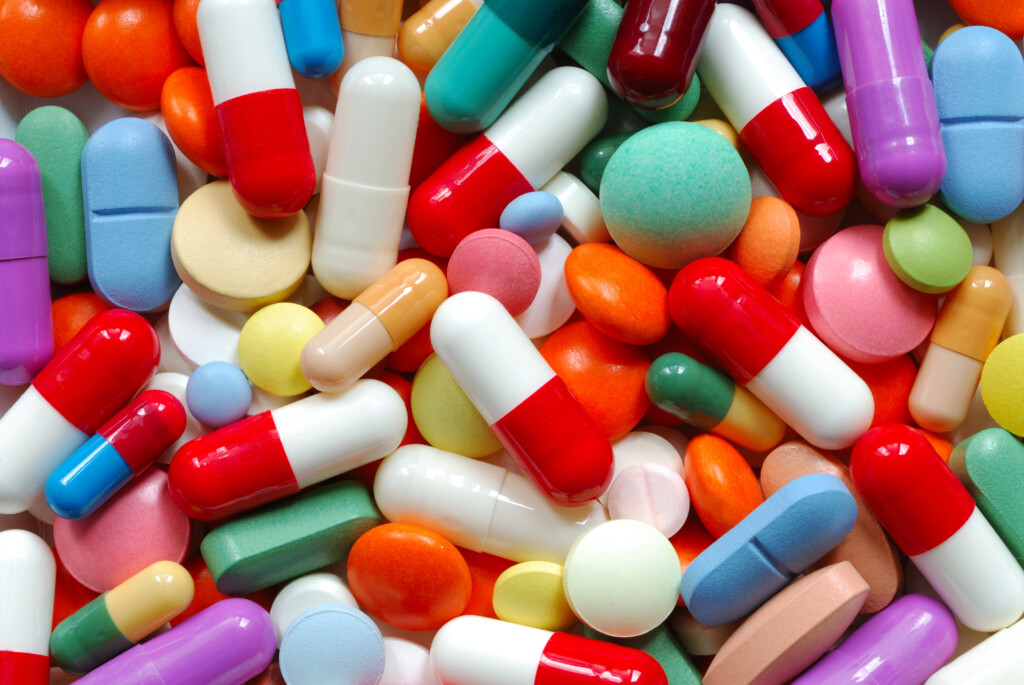Pharmaceuticals
Addressing the potential environmental threat from pharmaceuticals have long been on HELCOM´s agenda. The last HELCOM Ministerial Meeting in 2013 agreed to collect information and assess the state of contamination.
A report on pharmaceuticals in the Baltic Sea area was published in 2017 (UNESCO and HELCOM, 2017). It concluded that pharmaceuticals were occurring in the Baltic Sea area, such as the implemented pre-core indicator “Diclofenac” (HELCOM, 2018) which was detected in marine water, sediment, and biota. The Baltic Sea Action Plan: 2021 update (BSAP2021) (HELCOM, 2021) has noted the need to investigate pharmaceuticals as a group more thoroughly, as the full impact for the marine environment is still unknown and is therefore a reason of concern.

Basic facts
Pharmaceuticals are designed as biologically active substances to influence biological functions at low concentrations. Some medicines are to deprive pain, change hormonal levels or to cure e. g., cancer. In addition to human pharmaceuticals, veterinary pharmaceuticals for domesticated animals and pets are being used.
The residues of various pharmaceuticals in the aquatic environment originate mostly from wastewater releases. The pharmaceuticals in household wastewater come from excretions, incorrect disposal of unused medicines, and washing off pharmaceuticals applied to the skin. Research shows that not all pharmaceuticals are removed by conventional treatment in wastewater plants. Moreover, veterinary pharmaceuticals can have a more direct route into the environment, by entering the soil -and consequently groundwater, or in runoff to nearby rivers- via manure.
From the releases of e.g., wastewater treatment plants, and sometimes via watercourses like rivers and lakes, certain pharmaceuticals can end up in the marine environment. However, since marine organisms were not the intended users of neither human or veterinary pharmaceuticals – and that ecotoxicity tests on marine organisms are exceedingly rare – there is a concern that pharmaceuticals can have a negative effect on the marine environment. An additional level of concern has been raised about the combined effect of pharmaceuticals acting in a similar way, even though individual pharmaceuticals are at concentration levels below their therapeutic effect. It has been demonstrated that e.g., different hormonal contraceptives, all in concentrations below which the individual hormones would have an effect themselves, had detrimental effects on a local ecosystem (Kidd et al., 2007). There have been other examples in the world when high concentrations of individual pharmaceuticals lead to disastrous consequences for the population of unintendingly exposed (non-target) species (Swan et al., 2006).
The question remains whether the residues of the products released into the Baltic Sea environment remain active after disposal and if the concentration is such that residues cause an effect on the environment. There is not enough knowledge about the possible long-term effects of pharmaceuticals in the marine environment, which requires further investigations. The project PharmaSea will address HL22 and HL23 of the BSAP2021, namely to improve the knowledge base on and to identify priority pharmaceuticals in the Baltic Sea area.
Groups and Projects
PharmaSea – Pharmaceutical Substances in the Baltic Sea (September 2023 – December 2024)
Related content
Kidd, K. A., Blanchfield, P. J., Mills, K. H., Palace, V. P., Evans, R. E., Lazorchak, J. M., & Flick, R. W. (2007). Collapse of a fish population after exposure to a synthetic estrogen. Proceedings of the national academy of sciences, 104(21), 8897-8901.
HELCOM (2018) Diclofenac. HELCOM pre-core indicator report. ISSN: 2343-2543
HELCOM (2021). Baltic Sea Action Plan: 2021 update.
Swan, G. E., Cuthbert, R., Quevedo, M., Green, R. E., Pain, D. J., Bartels, P., … & Wolter, K. (2006). Toxicity of diclofenac to Gyps vultures. Biology letters, 2(2), 279-282.
UNECSO and HELCOM. (2017). Pharmaceuticals in the aquatic environment of the Baltic Sea region – A status report. UNESCO Emerging Pollutants in Water Series – No. 1, UNESCO Publishing, Paris.
